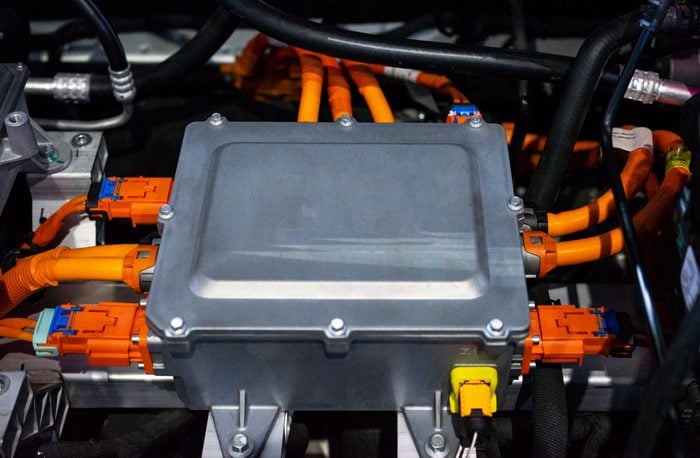Are Electric Car Batteries Recyclable?
Updated: Jul. 11, 2023

Once it stops powering your car, that EV battery is still useful. Here's what to know about repurposing and recycling it.
The worldwide push to transition to electric vehicles (EVs) should, in theory, reduce our greenhouse gas emissions and clean up our air. But it will also leave a cascade of spent batteries, to the tune of half a million a year by 2030. If most of those aren’t recycled, we’ll be stuck with a large pile of garbage and increased mining for raw materials.
Luckily, EV batteries are recyclable and reusable. New ones should last 10 and 15 years, similar to the battery in your gasoline-powered vehicle. After that, undamaged batteries can be repurposed into stationary storage for home solar systems, because they retain 70% to 80% of their capacity. Damaged or weakened batteries can go into the recycling stream.
Here’s what to know about recycling EV batteries.
On This Page
Are Electric Car Batteries Recyclable?
Yes. All EV batteries can and should be recycled.
“These processes have great recovery rates,” says Jessica Dunn, Ph.D., a senior analyst at the Union of Concerned Scientists. “Ninety-five percent of the lithium, manganese, cobalt and nickel can be recovered and used in the manufacturing of new batteries and EVs. It is exciting to see this is already happening at scale in the U.S.”
Access to efficient EV battery recycling was not always the case. But in the last couple of years, programs and technologies have excelled quickly — thanks, in part, to growing profits from increased mineral values. New recycling plants have also come online, including one of the largest in the country, run by Ascend Elements in Georgia.
The market for repurposing batteries into stationary storage is also growing quickly. Redwood Materials offers a program to collect EV batteries throughout California for repurposing and recycling. The company also recently received a $2 billion loan from the Department of Energy to scale up its Nevada plant. Plus, it’s building another plant in Southern California.
While the battery recycling industry has been quickly spinning up, there’s room for improvement. “We need to design the batteries better to be easily taken apart prior to recycling,” says Dunn. “But those not designed to be efficiently taken apart are still being recycled, they just don’t produce as high recycling profits.”
Reverse logistics for collecting batteries also needs more development, according to Mitch Ratcliffe, publisher of the sustainable living and recycling information site Earth911. “That is not necessarily available everywhere,” he says. “So not all EV batteries get recycled, but we’re headed there by end of the decade.”
Some believe another big step in technology will include recycling that recovers the full cathode, instead of just the constituent materials. “This process isn’t yet available at commercial scale but will likely be a big future cost saver,” says Dunn. Other future developments might include local micro-recycling plants and even 3D printed EV batteries.
What in an EV Battery Has Value?
The most valuable components that come from recycling an EV, or lithium-ion battery, include:
- Cobalt;
- Lithium;
- Nickel.
Recycling also recovers:
- Aluminum;
- Copper;
- Iron.
Most lithium-ion batteries are currently made with cobalt and nickel (called NMC and NCA batteries). But manufacturers are beginning to switch to lithium-iron phosphate (LFP) EV batteries, made from more commonly available materials like copper, iron and graphite.
“This can reduce the cost of EVs as well as the environmental impact, though it also reduces the economic value of battery recycling,” says Dunn. “However, it’s still important to recycle lithium and other minerals from these batteries.”
Why is Recycling EV Batteries Important?
Recycling EV batteries is a vital step toward making EVs sustainable because we can recover and reuse minerals already mined. That means less destruction of nature and more water savings, since mining lithium is water-intensive.
It also means fewer human rights abuses that arise from mines. And recycling components promotes a circular economy. Here are a few reasons why you should adopt a circular economy.
Also, in the case of NMC and NCA batteries, toxic components can leach from landfills and contaminate water and ecosystems. They can also start fires at landfills if there’s a thermal runaway.
“A battery that goes to the landfill is a complete waste of resources,” Dunn says. “But recycling batteries creates a domestic supply of battery materials that will support EV manufacturing in the long term.”
How To Recycle or Repurpose Your EV Battery
While the EV battery repurposing and recycling industry is quickly growing, it’s not yet uniform. So where to take your old battery will vary depending on the services offered where you live.
Many dealers that sell EVs will accept batteries. There are also national programs, like Battery Recyclers of America, which offer battery pickups in some locations. Also, some local auto shops, like Mile Hybrid in Denver, specialize in recycling and repurposing EV batteries.
Before handing over your battery, ask to make sure it’s going to actually be repurposed or recycled.
